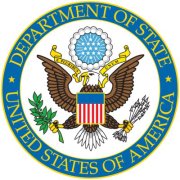
State Department Blog
"I Am Puerto Rican and American"
by Vanessa Colon
Dipnote: US Department of State Blog (October 4, 2012)
For a quick and surefire way to rankle a Puerto Rican, ask: "But Puerto Ricans aren't Americans, are they?" Heart rates quicken. Lips tighten to a thin line. Eyebrows rise above the hairline, and fingers are waved every which way as a Puerto Rican clarifies that we are very much American.
This question and its implications have followed me throughout my life, ever since I moved from Puerto Rico to Georgia at the age of 10. Learning to adjust to a school in which I was one of two Hispanics in my 5th grade class proved challenging.
"Do you have a green card?" "Does Puerto Rico have McDonald's? Cars?"
Initially, I barely tolerated these exchanges. In my mind, the other person's ignorance demonstrated a disregard for Puerto Rican culture, and the ways it formed a legitimate part of American society. With a cold civility, I'd answer the questions curtly, and quickly change the subject. And, of course, I have experienced outright prejudice. A group of kids in 6th grade, for instance, were fond of mocking me by singing a song that came complete with a choreographed hat dance -- talent wasted on a bad cause.
As I grew older, however, I came to recognize my own mismanagement of these situations. For those who meant to hurt me, I learned to gauge who held some sort of influence in my life, and ignore all those who didn't. Fortunately, people often meant no ill will on most occasions. For many, I was the first Puerto Rican they had ever met. Through their questions, they wished to show an interest in this enigmatic, tiny "island of enchantment," an island that's been part of the United States since the Spanish-American War in 1898. Sure, we take pride in having our own Olympic team. But as citizens of the United States, Puerto Ricans (including my own father and brother) have made significant contributions -- including serving in every major U.S. military engagement since World War I.
Furthermore, as I traveled and lived abroad, I began to recognize the areas in which my own knowledge was limited. Before visiting Turkey in 2003, I knew nothing of Ataturk, the first president of Turkey and founding father of their republic. In offices, restaurants, and even malls, I could see him featured prominently. To the Turkish citizen, this ignorance would be unforgivable. Yet far from being rude, Turks were open and gracious, and took me under their wing. My adopting a humble and kindly manner allowed for cultural exchange and friendships I still cherish.
Throughout my journeys now, I try to empty my mind of any assumptions. What I learn and the diverse people I encounter continue to surprise me. Similarly, I have also come to recognize my own influence in shaping others' impressions and conceptions of what it means to be American. This consciousness, along with my commitment to service, drew me to apply to the State Department-funded Charles B. Rangel Graduate Fellowship Program, which promotes greater diversity in the State Department by attracting and preparing members of minority groups historically underrepresented in the Foreign Service and those with financial need.
As a Rangel Fellow and diplomat, I am one of the diverse threads that make up the tapestry of American society. When I tell people I'm American, eyes still regularly narrow suspiciously as the person counters, "But where are you actually from?" After telling people I grew up in Puerto Rico, people still sigh with knowing relief and say, "I could tell you weren't a real American."
Rather than dwelling on these rare moments, I meditate on the greater narrative of my life, which has been blessed with a loving and supportive family, great friends, and exciting adventures. I also consider the person's intentions, and approach the experience as a teaching moment and part of my mission. And I proudly proclaim that I am Puerto Rican and American.
Vanessa Colon serves as Vice Consul at the U.S. Consulate General in Rio de Janeiro, Brazil.
